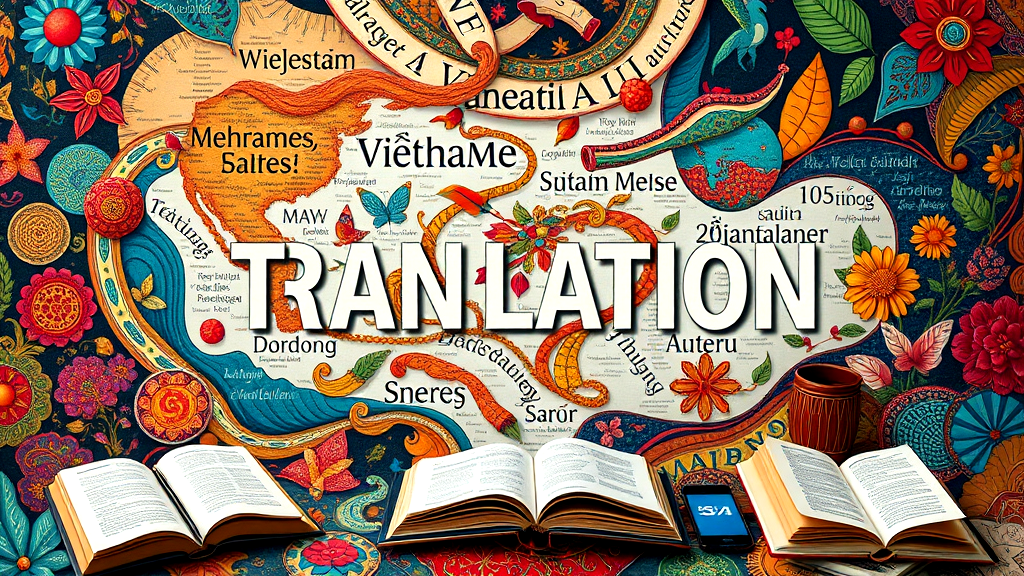Opportunities in English Vietnamese Translation
I’ve always been fascinated by the art of translation, especially English to Vietnamese. It’s like a multi-part series you can’t stop binge-watching. Translating isn’t just about swapping words, though. It’s about understanding the nuances and context, like a survival guide for effective communication. My journey began with honing my natural language proficiency. I realized how critical it was to grasp idioms and cultural references.
Working alongside software engineers, I saw how translation plays a pivotal role in tech. The translation studies I pursued helped me identify the correct language methods for diverse audiences. In the end, it’s all about making the language come alive and resonate with the reader.
Key Takeaways
-
Strong linguistic skills in both languages are crucial for effective translation.
-
Cultural understanding ensures translations resonate with the audience.
-
Technology aids, but cannot replace, the nuance of human translators.
-
Specialize in industries like healthcare and media for more opportunities.
-
Continuous learning and networking advance translation careers.

Skills Required for Successful Translation
Engaging in English-Vienamese translation requires a blend of diverse skills. Fluency in both languages is key, akin to a software engineer mastering coding languages. While formal studies are a good start, real-world communication hones this natural language proficiency. Embracing cultural nuances elevates translations, ensuring they connect with the audience. Understanding context is like a survival guide through linguistic mazes, with the right tone acting as a flashlight. It’s all about balancing the art and science of translation.
|
Skill |
Description |
Importance |
Example |
|---|---|---|---|
|
Fluency |
Mastery in both languages |
High |
Language proficiency |
|
Cultural Knowledge |
Understanding cultural context |
Medium |
Idioms, traditions |
|
Attention to Detail |
Accuracy in translation |
High |
Grammar, syntax |
|
Adaptability |
Flexibility with tools |
Medium |
Software updates |
-
Master both English and Vietnamese fluency.
-
Dive into cultural subtleties to enrich translations.
-
Stay updated with language trends and tools.
-
Ensure translations are accurate and contextually relevant.
-
Develop a niche expertise in specific industries.
-
Explore online courses and resources for skill improvement.
-
Engage with language communities for insights.
-
Regularly practice to maintain sharpness.

Common Challenges in Translation Work
Addressing the hurdles in translation, particularly in English Vietnamese translation, can feel like juggling flaming torches. Cultural context often trips up translators, turning a seemingly simple task into a linguistic maze. Machine translations? They’re like trying to replace a gourmet chef with a microwave. Sure, it gets the job done, but it lacks flavor and nuance. Freelancers face the constant ebb and flow of demand, making specialization in a niche as crucial as a life vest on a sinking ship. And let’s not forget industry jargon, which can be as baffling as trying to read hieroglyphics without a Rosetta Stone.
|
Challenge |
English Vietnamese Translation |
Impact on Work |
Resolution Strategy |
|---|---|---|---|
|
Cultural Nuances |
High |
Misinterpretation |
Cultural Research |
|
Machine Translation |
Medium |
Quality Issues |
Human Review |
|
Demand Fluctuations |
High |
Income Instability |
Niche Specialization |
|
Industry Jargon |
Medium |
Miscommunication |
Terminology Training |

The Role of Technology in Translation
The impact of technology on translation has been a mixed bag. While machine translation tools offer speed, they often lack natural language proficiency. This is crucial in English Vietnamese translation, where cultural context plays a significant role. Software engineers develop tools that aid translators, but these tools can’t replace human intuition. Keeping up with tech advancements can be like a survival guide for linguists in this field. These tools can enhance productivity and accuracy, but the correct language and cultural nuances need the human touch. For those interested in the multi-part series of translation studies, exploring advancements in AI can be insightful. They can find more detailed insights in the guide from HubSpot’s resource on translation technology here.
|
Aspect |
Impact |
Requirement |
Tools |
|---|---|---|---|
|
Machine Translation |
Moderate |
Human Review |
Translation Software |
|
Cultural Nuances |
High |
Human Intuition |
Cultural Training |
|
Language Proficiency |
Essential |
Formal Education |
Language Courses |
|
Translation Speed |
Increased |
Time Management |
Time-Saving Tools |
|
Content Accuracy |
Variable |
Detailed Checking |
Grammar Checkers |

Five Industries Needing Translation Services
Industries in need of translation services continue to grow, with healthcare, legal, financial, technology, and media leading the charge. In healthcare, accurate translation can be a matter of life and death. The legal industry demands precise language, where even a minor error can lead to significant consequences. Financial services require expertise in technical jargon, making English Vietnamese translation critical for accuracy. Technology companies constantly innovate, needing translations that capture cutting-edge concepts. Media seeks to engage diverse audiences, ensuring cultural nuances are respected. I find that each field has unique challenges, but the right skills make all the difference.
|
Industry |
Translation Needs |
Importance Level |
|---|---|---|
|
Healthcare |
Medical Terminology |
Critical |
|
Legal |
Document Precision |
High |
|
Financial |
Technical Jargon |
Significant |
|
Technology |
Current Innovations |
Essential |
|
Media |
Cultural Sensitivity |
High |
-
Healthcare requires precise terminology.
-
Legal documents must be accurate.
-
Financial services need technical expertise.
-
Technology demands current understanding.
-
Media focuses on cultural accuracy.

Building a Career in Translation
Kicking off a path in translation, especially with English Vietnamese translation, can be quite a journey. I find the blend of languages and cultures fascinating. Translators often start small but can expand into editing or management roles. It’s like starting with a canvas and ending with a masterpiece. The field is dynamic, so staying updated on industry trends is essential. Networking plays a huge role, too. It’s not just about what you know, but who you know. Some say it’s the ultimate multi-part series of career evolution. Continuous learning is my secret weapon, ensuring I stay relevant. This isn’t just a job; it’s a lifestyle that requires passion and commitment.
|
Skills |
Challenges |
Technology |
Opportunities |
|---|---|---|---|
|
Language fluency |
Machine translation |
Grammar tools |
Editing roles |
|
Cultural knowledge |
Fluctuating demand |
Language software |
Project management |
|
Translation studies |
Freelance adaptation |
Software engineers |
Diversification |
|
Correct language |
Specialization |
Natural language proficiency |
Networking |
|
en-us understanding |
Industry niches |
en-us tools |
Survival guide |
Resources for Improving Translation Skills
Seeking ways to improve your translation prowess? I’ve found various methods that cater to different learning styles. For those into English Vietnamese translation, practice is key. Engage in real-world projects or volunteer translations. This hands-on approach bridges gaps between theory and practice. Online courses, like those offered by language schools, can refine your skills further. Networking with fellow translators can also be enlightening, offering fresh perspectives and tips. Keeping up with translationstudies literature is a must. It’s like having a survival guide in your back pocket. Lastly, specialized tools and software engineers can streamline your workflow, boosting efficiency.
|
Resource Type |
Benefit |
Relevance |
Suggested Usage |
|---|---|---|---|
|
Online Courses |
Structured learning |
High |
Daily study routine |
|
Real-World Projects |
Practical experience |
Medium |
Weekly participation |
|
Networking |
Peer insights |
High |
Attend meetups |
|
Translation Tools |
Enhanced efficiency |
High |
Regular use |
|
Academic Journals |
In-depth knowledge |
Medium |
Monthly reading |
-
Enroll in translationstudies courses.
-
Join translation communities.
-
Participate in language challenges.
-
Use translation software.
-
Read bilingual books.
-
Watch movies with subtitles.
-
Practice daily with en-us materials.
Conclusion
Opportunities in English-Vienamese translation are abundant for those with the right skills. Fluency in both languages is key. But understanding cultural nuances? That’s the real magic. It’s like knowing the secret ingredient in a recipe. Without it, the dish falls flat.
Technological tools can boost efficiency, but human touch remains irreplaceable. Think of it as the difference between a store-bought cake and grandma’s homemade version. Industries like healthcare and media are hungry for skilled translators. They need experts who understand their unique lingo and can communicate it effectively.
Building a career in translation requires passion and perseverance. It’s not just about words; it’s about connecting people and ideas. With continuous learning and networking, anyone can turn this passion into a rewarding career. Who knows? You might just become the bridge between cultures.
FAQ
-
What skills do I need to become a successful English-Vienamese translator?
You need strong linguistic skills in both languages. Formal studies can be important, with experts suggesting about 3 to 5 years. Cultural understanding matters, too, so your translation resonates.
-
What challenges might I face in the translation industry?
Machine translation is a biggie, but human nuance can’t be matched. Freelancers often navigate fluctuating demand, making adaptability key. Specializing in a niche can help stabilize opportunities.
-
How does technology impact translation today?
Technology, while advancing, still can’t replace human touch. It can, however, enhance accuracy. Language-specific software and grammar tools are helpful, but staying updated is a must.
-
Which industries require English-Vienamese translation services?
Healthcare, legal, financial services, technology, and media all need translators. Each has unique terminologies, stressing the need for specialized knowledge.
-
How can I improve my translation skills?
Formal education and online courses are good starts. Engage with professional communities and follow industry trends. Webinars and language-specific tools can further hone your skills.




